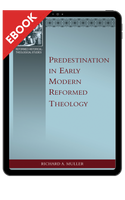
Muller, Richard A.
Description
In the newest Reformed Historical-Theological Study, Dr. Richard A. Muller delves into one of the most controversial doctrines of Reformed Theology: predestination. Muller carefully investigates key incidents that illustrate the doctrine’s complexity and development by surveying Reformed thought on predestination in the sixteenth and seventeenth centuries. Along the way, Muller challenges distorted ideas about the placement of predestination in theological systems, naïve readings of Calvin based solely on his Institutes, simplistic representations of supra- and infralapsarian debates, and uncharitable views of Reformed theologians as hyper-dogmatists obsessed with their own tradition.
Contents
Acknowledgments
Abbreviations
Introduction
Index
Endorsements
“In this welcome and enjoyable collection of essays, Richard Muller deploys both profound learning and forensic acuity to interrogate and challenge a number of unhelpful assumptions that still distort the study of early modern Reformed theology. The theological tradition that emerges is shown to be more diverse, more subtle, and more interesting than it has often been taken to be. The essays in this volume are fine examples of how tightly focused and readable analyses can nevertheless shed significant light on a wider field of study.”
—Stephen Hampton, dean of Peterhouse, Cambridge University
“Throughout this work, Muller guides the reader along the via media, medians, and limits of classic Reformed confessional orthodox formulations of the doctrine of predestination, traced with illuminating nuance and detail from the early modern sources. A tour de force for student and scholar alike.”
—Todd M. Rester, associate professor of church history, Westminster Theological Seminary
About the Author
Richard A. Muller is P. J. Zondervan Professor of Historical Theology Emeritus at Calvin Theological Seminary and scholar in residence at Puritan Reformed Theological Seminary. He is the author of numerous books, including Divine Will and Human Choice, Grace and Freedom, and the multivolume Post-Reformation Reformed Dogmatics.